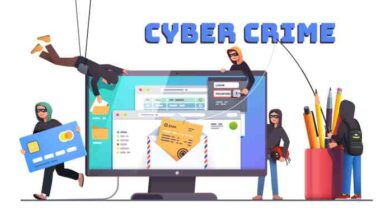
Are Ethical Hackers the Digital Security Answer?
Are ethical hackers the digital security answer? In a world increasingly reliant on digital infrastructure, the question of cybersecurity takes center stage. As cyber threats evolve and become more sophisticated, the need for proactive defense mechanisms has never been greater.
This is where ethical hackers come in, wielding their skills not to exploit vulnerabilities but to identify and fix them before malicious actors can.
Ethical hackers, also known as white-hat hackers, play a crucial role in safeguarding digital assets by mimicking the tactics of cybercriminals. They use their knowledge of hacking techniques to test systems for weaknesses and vulnerabilities, allowing organizations to strengthen their defenses and prevent breaches before they occur.
By adopting a proactive approach, ethical hackers act as a vital shield against the ever-growing threat landscape.
The Role of Ethical Hackers in Digital Security
Ethical hackers are cybersecurity professionals who use their skills to identify and exploit vulnerabilities in computer systems and networks, but with the express permission of the system owner. They play a crucial role in safeguarding digital assets by proactively identifying and mitigating security risks before malicious actors can exploit them.
The Responsibilities of Ethical Hackers
Ethical hackers are responsible for conducting security assessments, penetration testing, and vulnerability analysis to identify weaknesses in systems and applications. They perform these tasks to:
- Identify and report vulnerabilities to system owners.
- Recommend security improvements and solutions to mitigate identified risks.
- Test the effectiveness of existing security measures and controls.
- Educate organizations about security best practices and potential threats.
The Difference Between Ethical and Malicious Hacking
Ethical hackers operate within a legal and ethical framework, with the explicit consent of the system owner. They are guided by ethical hacking principles and codes of conduct. Malicious hackers, on the other hand, are individuals who exploit vulnerabilities in systems for personal gain, often with criminal intent.
They may steal sensitive data, disrupt services, or cause financial damage.
Real-World Examples of Ethical Hacking Successes
Ethical hackers have played a vital role in preventing numerous security breaches. For example:
- In 2017, a team of ethical hackers discovered a critical vulnerability in the Equifax credit reporting agency’s systems. This vulnerability allowed attackers to steal the personal data of millions of individuals. Thanks to the timely discovery and reporting of this vulnerability, Equifax was able to patch the flaw before it could be exploited by malicious actors, preventing a major data breach.
- In 2019, a group of ethical hackers identified a vulnerability in a popular online banking platform. This vulnerability could have allowed attackers to gain unauthorized access to customer accounts and steal funds. The ethical hackers reported the vulnerability to the bank, which was able to patch the flaw before it could be exploited.
Ethical Hacking Techniques and Methods: Are Ethical Hackers The Digital Security Answer
Ethical hacking techniques are essential tools for securing digital assets and identifying vulnerabilities that could be exploited by malicious actors. These techniques are designed to simulate real-world attacks, allowing security professionals to proactively address potential threats and strengthen defenses.
Penetration Testing
Penetration testing, often referred to as “pen testing,” is a simulated attack that aims to identify vulnerabilities in a system or network. It involves a systematic process of attempting to exploit weaknesses to assess the security posture of a target.
The goal is to identify vulnerabilities that could be exploited by malicious actors and provide recommendations for remediation.Penetration testing involves various phases, including:
- Planning and Scoping:Defining the scope of the test, including the target systems, networks, and applications, and outlining the testing objectives.
- Information Gathering:Gathering information about the target, such as its network topology, operating systems, and applications, to identify potential vulnerabilities.
- Vulnerability Scanning:Using automated tools to scan for known vulnerabilities and misconfigurations in the target system.
- Exploitation:Attempting to exploit identified vulnerabilities to gain access to the target system.
- Reporting:Documenting the findings, including the vulnerabilities discovered, the methods used to exploit them, and recommendations for remediation.
Vulnerability Scanning
Vulnerability scanning is a process of identifying potential security weaknesses in systems, networks, and applications. It involves using automated tools to scan for known vulnerabilities and misconfigurations. The process helps organizations identify and prioritize security risks, enabling them to address vulnerabilities before they are exploited by attackers.
Are ethical hackers the answer to our digital security woes? It’s a question that sparks debate, much like the fundamental question of whether to start with a running stitch or a back stitch in your sewing lessons basic stitches.
Just as a strong foundation of basic stitches is crucial for a successful sewing project, a solid understanding of ethical hacking techniques is essential for building a robust and resilient digital defense system.
Vulnerability scanning tools typically work by comparing the target system against a database of known vulnerabilities, such as the Common Vulnerabilities and Exposures (CVE) database. The tools can identify a wide range of vulnerabilities, including:
- Operating system vulnerabilities:Outdated operating systems and unpatched software can contain known vulnerabilities that attackers can exploit.
- Application vulnerabilities:Web applications, databases, and other software applications can contain vulnerabilities that could allow attackers to gain unauthorized access or compromise data.
- Network vulnerabilities:Misconfigured firewalls, routers, and switches can create security gaps that attackers can exploit.
Social Engineering
Social engineering is a technique that uses psychological manipulation to gain access to sensitive information or systems. It involves exploiting human weaknesses and vulnerabilities to trick individuals into revealing confidential data or granting unauthorized access. Social engineering attacks can be highly effective, as they often target individuals’ trust and lack of security awareness.Common social engineering techniques include:
- Phishing:Sending fraudulent emails or messages that appear to be from legitimate sources, tricking recipients into revealing sensitive information, such as login credentials or financial data.
- Baiting:Offering tempting incentives, such as free software or discounts, to entice individuals to download malicious files or visit compromised websites.
- Pretexting:Creating a convincing story or scenario to gain access to information or systems by impersonating someone with authority or legitimacy.
- Scareware:Using fear and intimidation tactics to trick individuals into installing malicious software or revealing sensitive information.
Comparison of Ethical Hacking Techniques
Ethical hacking techniques differ in their effectiveness and scope. Penetration testing is a comprehensive approach that aims to simulate real-world attacks, while vulnerability scanning focuses on identifying known vulnerabilities. Social engineering, on the other hand, exploits human vulnerabilities to gain access to information or systems.
The effectiveness of each technique depends on the specific context and the target system. For example, penetration testing is more effective at identifying complex vulnerabilities, while vulnerability scanning is better suited for identifying known weaknesses. Social engineering attacks can be highly effective, especially when targeting individuals with limited security awareness.
The Importance of Ethical Hacking Certifications
In the ever-evolving landscape of cybersecurity, demonstrating expertise and credibility is paramount. Ethical hacking certifications play a crucial role in validating an individual’s knowledge and skills, enhancing their career prospects, and boosting their trustworthiness within the cybersecurity domain. Ethical hacking certifications serve as a recognized benchmark for individuals seeking to establish themselves as cybersecurity professionals.
These certifications act as a testament to their proficiency in identifying and mitigating vulnerabilities, safeguarding organizations against potential threats.
While ethical hackers are certainly a crucial part of the digital security puzzle, sometimes the best solutions are the simplest. A thoughtful handmade gift, like a simple DIY scarf , can be a powerful way to show someone you care.
Just like ethical hackers work to protect our digital lives, a handmade gift demonstrates a commitment to personal care and connection.
Prominent Ethical Hacking Certifications
Ethical hacking certifications encompass a range of specialized areas, providing individuals with the opportunity to specialize in their chosen field.
- Certified Ethical Hacker (CEH):This certification, offered by EC-Council, is widely recognized and focuses on a comprehensive understanding of ethical hacking methodologies, including reconnaissance, vulnerability scanning, penetration testing, and incident response.
- Offensive Security Certified Professional (OSCP):This certification, offered by Offensive Security, is highly regarded for its rigorous hands-on approach. It emphasizes practical penetration testing skills and requires candidates to complete a challenging penetration testing exercise.
- Certified Information Systems Security Professional (CISSP):While not strictly an ethical hacking certification, the CISSP, offered by ISC², covers a broad range of cybersecurity domains, including security architecture and design, risk management, and incident response. Individuals holding this certification demonstrate a deep understanding of cybersecurity principles, making them highly valuable in various cybersecurity roles.
Benefits of Ethical Hacking Certifications
Ethical hacking certifications offer a multitude of benefits for individuals and organizations alike.
- Enhanced Career Prospects:Holding an ethical hacking certification significantly increases an individual’s employability and earning potential. Recruiters often prioritize candidates with relevant certifications, recognizing their demonstrated expertise and commitment to professional development.
- Increased Credibility and Recognition:Certifications serve as a tangible symbol of an individual’s knowledge and skills, boosting their credibility and recognition within the cybersecurity community. Organizations often trust certified professionals to handle sensitive security matters.
- Improved Security Posture:Organizations benefit from employing certified ethical hackers, as they possess the expertise to identify and mitigate vulnerabilities, enhancing the overall security posture of the organization. This reduces the risk of data breaches and other security incidents.
- Enhanced Professional Development:The process of preparing for and obtaining an ethical hacking certification encourages continuous learning and professional development. Individuals are exposed to the latest security threats, best practices, and emerging technologies, ensuring they stay ahead of the curve in the dynamic cybersecurity landscape.
While ethical hackers are a vital part of a strong security posture, they can’t be the sole answer. To truly stay ahead of threats, businesses need to adopt proactive approaches like how aiops can benefit businesses by automating incident response and leveraging AI to identify patterns and predict vulnerabilities.
This holistic approach, combining human expertise with cutting-edge technology, is the key to building a truly secure digital landscape.
Ethical Hacking in the Modern Landscape

The digital landscape is constantly evolving, bringing with it new threats and vulnerabilities that require innovative solutions. Ethical hackers play a crucial role in navigating this dynamic environment, adapting their skills and techniques to stay ahead of malicious actors. This section explores the evolving nature of cyber threats and how ethical hackers are adapting to protect organizations and individuals from these dangers.
The Evolving Threat Landscape
The digital world is becoming increasingly interconnected, with individuals, businesses, and governments relying heavily on technology for daily operations. This interconnectedness, however, creates new avenues for cybercriminals to exploit. Emerging threats include:
- Ransomware:This type of malware encrypts a victim’s data, making it inaccessible until a ransom is paid. Ransomware attacks have become increasingly sophisticated, targeting critical infrastructure and businesses, causing significant financial losses and operational disruptions.
- Artificial Intelligence-Driven Attacks:Advancements in AI are being used by cybercriminals to automate attacks, making them more efficient and harder to detect. AI-powered tools can be used for phishing, malware development, and social engineering, posing significant challenges to traditional security measures.
- Zero-Day Exploits:These are vulnerabilities in software that are unknown to developers and have no available patches. Exploiting zero-day vulnerabilities allows attackers to gain unauthorized access to systems before security measures can be implemented.
- Data Breaches:The theft of sensitive data, such as personal information, financial records, and intellectual property, can have devastating consequences for individuals and organizations. Data breaches are often caused by vulnerabilities in software, weak passwords, or phishing attacks.
Ethical Hacking
Ethical hacking, often referred to as penetration testing, is a crucial aspect of cybersecurity. It involves simulating real-world attacks to identify vulnerabilities and weaknesses in systems and networks. Ethical hackers employ a wide range of techniques and tools to assess security posture, providing valuable insights for organizations to strengthen their defenses.
Collaborative Approach to Ethical Hacking, Are ethical hackers the digital security answer
Ethical hackers rarely operate in isolation. They often work in collaboration with security teams and organizations to achieve a comprehensive and effective security assessment. This collaborative approach enhances the effectiveness of ethical hacking by leveraging diverse expertise, perspectives, and resources.
- Shared knowledge and expertise:Ethical hackers from different backgrounds bring unique skills and experiences to the table. This diversity of expertise allows for a more thorough and comprehensive security assessment, covering various attack vectors and vulnerabilities.
- Enhanced communication and coordination:Collaborative efforts foster open communication channels, enabling efficient knowledge sharing and coordination between ethical hackers and security teams. This facilitates a smoother workflow, ensuring that findings are effectively communicated and addressed.
- Faster identification and remediation:By working together, ethical hackers and security teams can identify vulnerabilities and implement remediation strategies more quickly. This collaborative approach reduces the time it takes to address security risks, minimizing potential damage.
The Importance of Communication and Knowledge Sharing
Effective communication and knowledge sharing are essential for a successful collaborative ethical hacking process. Ethical hackers need to clearly communicate their findings and recommendations to security teams, while security teams need to provide context and guidance to ethical hackers.
“Effective communication is key to bridging the gap between ethical hackers and security teams, ensuring that vulnerabilities are addressed in a timely and efficient manner.”
- Clear and concise reporting:Ethical hackers must provide detailed and comprehensive reports outlining the vulnerabilities they have discovered, the potential impact, and recommended remediation strategies.
- Open dialogue and feedback:Regular communication and feedback loops allow for a collaborative approach to problem-solving, ensuring that ethical hackers understand the context of their findings and security teams have a clear understanding of the vulnerabilities.
- Knowledge sharing within the cybersecurity community:Sharing knowledge and best practices within the cybersecurity community is crucial for collective improvement. Ethical hackers can contribute to this by sharing their experiences, techniques, and findings, fostering a culture of continuous learning and improvement.
Collaborative Ethical Hacking Scenario
Imagine a scenario where a large financial institution is preparing for a major digital transformation initiative. To ensure the security of their new systems, they engage a team of ethical hackers to conduct a comprehensive security assessment.
- Initial assessment:The ethical hackers conduct a thorough reconnaissance phase, identifying potential entry points and vulnerabilities in the organization’s network and systems.
- Collaboration with security teams:They collaborate with the institution’s security team, sharing their findings and discussing potential risks. This collaborative approach allows for a deeper understanding of the organization’s security posture and the impact of the identified vulnerabilities.
- Penetration testing:The ethical hackers conduct penetration tests, simulating real-world attacks to assess the effectiveness of the organization’s security controls. They leverage their expertise in various attack vectors, including social engineering, phishing, and malware attacks.
- Remediation recommendations:Based on their findings, the ethical hackers provide detailed recommendations for remediation strategies. They work closely with the security team to ensure that the recommendations are practical, effective, and aligned with the organization’s security objectives.
This scenario highlights the importance of a collaborative approach to ethical hacking, where ethical hackers and security teams work together to identify vulnerabilities, implement remediation strategies, and strengthen the organization’s overall security posture.
Ethical Hacking
Ethical hacking, while a crucial aspect of cybersecurity, also presents a complex ethical landscape. The practice involves exploiting vulnerabilities in systems to identify and address security weaknesses, but this process inherently raises ethical considerations.
Ethical Implications of Ethical Hacking Practices
The ethical implications of ethical hacking practices are multifaceted. Ethical hackers operate in a gray area, where they must navigate the fine line between exploiting vulnerabilities and causing harm. This tension requires a deep understanding of ethical principles and responsible conduct.
- Privacy Concerns:Ethical hackers may access sensitive data during their assessments. Maintaining confidentiality and respecting the privacy of individuals is paramount. Ethical hackers must adhere to strict guidelines and only access information relevant to their assessment.
- Potential for Abuse:The techniques used in ethical hacking can be misused for malicious purposes. It is crucial that ethical hackers operate within legal boundaries and use their skills for legitimate security purposes. Any unauthorized access or exploitation of vulnerabilities is unethical and illegal.
- Transparency and Disclosure:Ethical hackers should maintain transparency with the organization they are assessing. They should clearly communicate their findings, including any vulnerabilities discovered, and provide recommendations for remediation. This ensures that organizations can take appropriate steps to improve their security posture.
Ethical Dilemmas Faced by Ethical Hackers
Ethical hackers often encounter situations where they must make difficult decisions that involve ethical considerations. These dilemmas highlight the importance of ethical reasoning and responsible conduct within the field.
- Reporting Vulnerabilities:Ethical hackers may discover vulnerabilities that could have significant consequences if exploited by malicious actors. They must decide when and how to report these vulnerabilities to the organization, balancing the need for responsible disclosure with the potential for harm if the vulnerabilities are not addressed promptly.
- Unauthorized Access:Ethical hackers may be granted limited access to systems for their assessments. However, they may encounter situations where they need to access information beyond the scope of their authorization. They must carefully consider the ethical implications of such actions and ensure that their actions are justified and necessary.
- Data Retention:Ethical hackers may collect sensitive data during their assessments. They must decide how to handle this data ethically. Deleting unnecessary information, anonymizing sensitive data, and adhering to data privacy regulations are crucial aspects of responsible data management.
Importance of Responsible and Ethical Conduct
Ethical hacking requires a strong commitment to ethical principles. Responsible and ethical conduct is essential for maintaining the integrity of the field and ensuring that ethical hacking practices are used for good.
“Ethical hackers are like doctors for digital systems. They diagnose vulnerabilities, prescribe remedies, and ultimately help organizations stay healthy.”
- Maintaining Trust:Ethical hackers must build trust with organizations and individuals. This requires transparency, honesty, and a commitment to ethical principles. Trust is crucial for ensuring that ethical hacking practices are viewed as legitimate and beneficial.
- Protecting the Public:Ethical hackers play a vital role in protecting the public from cyber threats. By identifying and mitigating vulnerabilities, they contribute to a safer and more secure digital environment. Their actions help to prevent data breaches, financial losses, and other negative consequences of cyberattacks.
- Advancing Cybersecurity:Ethical hackers contribute to the advancement of cybersecurity by sharing their knowledge and insights. Their work helps to develop new security tools, techniques, and best practices, making the digital world more secure for everyone.







